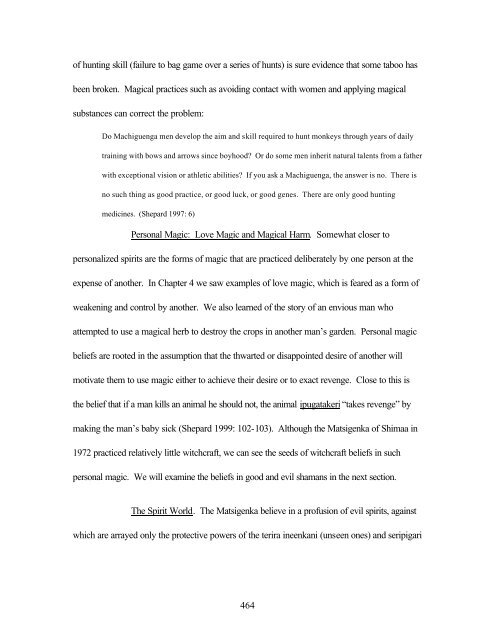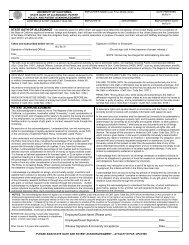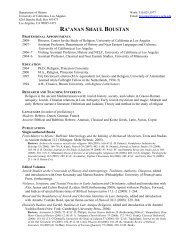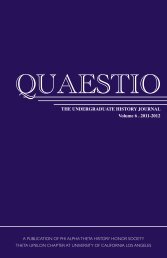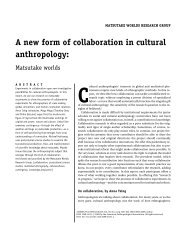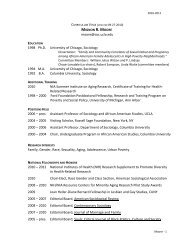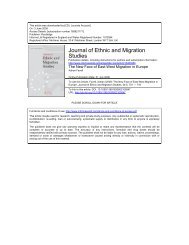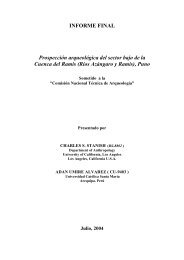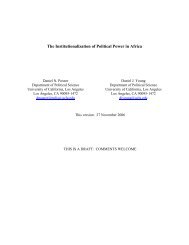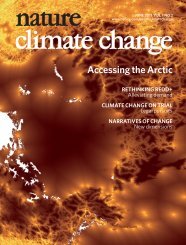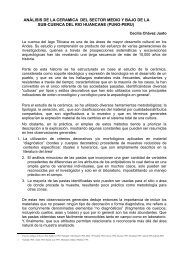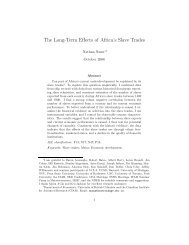433 Chapter Seven Cosmos For the Matsigenka of Shimaa, kameti ...
433 Chapter Seven Cosmos For the Matsigenka of Shimaa, kameti ...
433 Chapter Seven Cosmos For the Matsigenka of Shimaa, kameti ...
Create successful ePaper yourself
Turn your PDF publications into a flip-book with our unique Google optimized e-Paper software.
<strong>of</strong> hunting skill (failure to bag game over a series <strong>of</strong> hunts) is sure evidence that some taboo has<br />
been broken. Magical practices such as avoiding contact with women and applying magical<br />
substances can correct <strong>the</strong> problem:<br />
Do Machiguenga men develop <strong>the</strong> aim and skill required to hunt monkeys through years <strong>of</strong> daily<br />
training with bows and arrows since boyhood? Or do some men inherit natural talents from a fa<strong>the</strong>r<br />
with exceptional vision or athletic abilities? If you ask a Machiguenga, <strong>the</strong> answer is no. There is<br />
no such thing as good practice, or good luck, or good genes. There are only good hunting<br />
medicines. (Shepard 1997: 6)<br />
Personal Magic: Love Magic and Magical Harm. Somewhat closer to<br />
personalized spirits are <strong>the</strong> forms <strong>of</strong> magic that are practiced deliberately by one person at <strong>the</strong><br />
expense <strong>of</strong> ano<strong>the</strong>r. In <strong>Chapter</strong> 4 we saw examples <strong>of</strong> love magic, which is feared as a form <strong>of</strong><br />
weakening and control by ano<strong>the</strong>r. We also learned <strong>of</strong> <strong>the</strong> story <strong>of</strong> an envious man who<br />
attempted to use a magical herb to destroy <strong>the</strong> crops in ano<strong>the</strong>r man’s garden. Personal magic<br />
beliefs are rooted in <strong>the</strong> assumption that <strong>the</strong> thwarted or disappointed desire <strong>of</strong> ano<strong>the</strong>r will<br />
motivate <strong>the</strong>m to use magic ei<strong>the</strong>r to achieve <strong>the</strong>ir desire or to exact revenge. Close to this is<br />
<strong>the</strong> belief that if a man kills an animal he should not, <strong>the</strong> animal ipugatakeri “takes revenge” by<br />
making <strong>the</strong> man’s baby sick (Shepard 1999: 102-103). Although <strong>the</strong> <strong>Matsigenka</strong> <strong>of</strong> <strong>Shimaa</strong> in<br />
1972 practiced relatively little witchcraft, we can see <strong>the</strong> seeds <strong>of</strong> witchcraft beliefs in such<br />
personal magic. We will examine <strong>the</strong> beliefs in good and evil shamans in <strong>the</strong> next section.<br />
The Spirit World. The <strong>Matsigenka</strong> believe in a pr<strong>of</strong>usion <strong>of</strong> evil spirits, against<br />
which are arrayed only <strong>the</strong> protective powers <strong>of</strong> <strong>the</strong> terira ineenkani (unseen ones) and seripigari<br />
464


